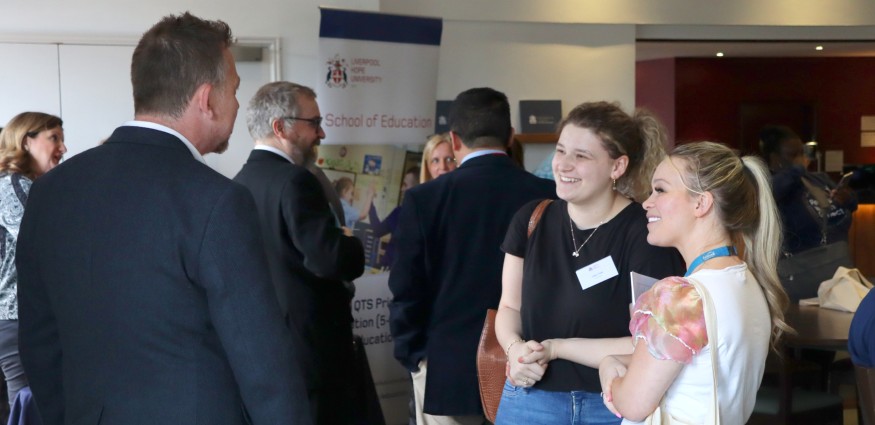Liverpool Hope University hosted Third Sector organisations from across Liverpool City Region at a networking event designed to explore how the University could better support the charity sector.
Representatives from more than 40 organisations attended Collaborate & Connect: How academia can engage and support the Third Sector to learn about the cutting-edge research of Hope academics and to discuss how they can work in partnership with the University.
A diverse range of organisations were in attendance at Hope Park, where staff from Hope’s 10 Schools and Departments had the opportunity to showcase the impact of their research and hear what they can do to ensure their courses continue to meet the needs of the charity sector.
Event organiser and Dean of the School of Social Sciences, Professor Michael Lavalette, said: “Liverpool Hope is committed to creating lasting positive change in our community through our partnerships, our research and the graduates we develop.
“Ensuring we are aligned with the Third Sector is central to that and this event allowed us to strengthen our existing ties with charity organisations across the Liverpool City Region.
“It provided us with an opportunity to showcase our expertise and how the Third Sector can utilise it, but also to learn more about the needs of the sector and what the University can do to support those needs.”
Expect Ltd, Strawberry Field, Refugee Women Connect and Warrington Peace Centre were among the charities in attendance, as well as social care organisations such as Nugent Care and Sefton Carers.
For Natalie Willets, Therapeutic Connection Lead at Nugent Care, the event was an opportunity to strengthen existing links.
Natalie is the Lead Partner for a collaboration between Hope and Nugent, which sees the two organisations work together to share research and develop opportunities, including the creation of a social work apprenticeship in partnership with local authorities in the Liverpool City Region.
Nugent’s partnership is primarily with the School of Social Science, but the networking event provided Natalie with an opportunity to explore opportunities with the School of Mathematics, Computer Science and Engineering and the School of Law.
“Working with Hope is absolutely crucial to what we do,” she said.
“A big part of it is having a forward-thinking approach to make sure we stay ahead of the game in terms of research and the emerging technologies we can bring into the world of social care and education that we inhabit.
“Collaborative working means we can access the latest research and the portfolio of skills behind it and it also allows us to share what Nugent does with students so they can see their subject beyond the world of academia.
“I have also been invited onto the curriculum review boards in the School of Social Sciences, which is really important for us because it gives us a chance to highlight the skills we need students to develop.”
In contrast, the event provided Speke Training and Education Centre (STEC) with a chance to explore a brand new relationship with the University.
Launched in 1983, STEC is a community organisation whose primary aim is to relieve poverty and advance education.
Its base in Garston serves as the office space for more than 20 local businesses, whose financial contribution allows STEC to also operate a social space for a cohort of community organisations and charities.
“I can see that we have got a lot to offer Hope and that Hope has got a lot to offer STEC,” said Chair, Stuart Fitzgerald.
“The business community in Speke has massive companies working in pharmaceutical, automotive and aviation and they are doing amazing things.
“I think Hope has got an opportunity to connect with the business sector in that part of Liverpool through STEC, but also to connect with the communities to help us deliver our goals of alleviating poverty and enhancing education.
“We have spoken to eight of the University’s academic schools today because we have already identified potential links and feel it can be a mutually beneficial relationship.”



